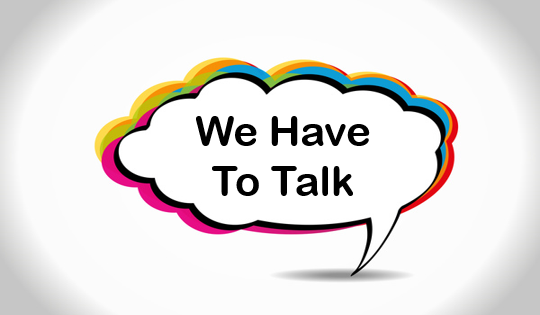
Jerry Seinfeld once joked..."We have to talk" are the worst four words in the English language.
In most cases, if someone says that phrase to you, an unpleasant conversation is about to start. In some situations, it could also mean a relationship is going to end.
I know a young leader at a bank who is in a high-potential program. He was told he would be promoted last December if he hit his goals. All his objectives were achieved, but he never received any feedback about the new position. In fact, he hasn't had a one-on-one meeting with his manager in over five months. He told me he is looking for a new job because he doesn't feel valued. I'm sure his manager is going to be surprised when he says..."We have to talk."
The latest Gallup research shows this situation is not unique.
51% of American workers are actively searching for new positions
81% of millennials say they never receive regular feedback
85% of millennials say they want feedback but admit they never ask their manager for it
While the factors that contribute to these statistics are different in each organization, one solution that will help every leader build better relationships, increase engagement and bring out the best in people is to schedule frequent, one-on-one, face-to-face meetings with the people they work with, live with and serve.
Unfortunately, we live in a world where too many people prefer to send an email or text instead of talking in real time. As a result, their one-on-one conversation skills keep getting weaker.
Sherry Turkle, author of "Reclaiming Conversation," has done extensive research on the consequences of this trend at work, in our schools and with our families. She says...
"Face-to-face conversation is the most human---and humanizing---thing we do. Fully present to one another, we learn to listen. It's where we develop the capacity for empathy. It's where we experience the joy of being heard, of being understood.
But these days we find ways around conversation. We hide from each other even as we're constantly connected to each other.
Even children text rather than talk face-to-face with friends---or, for that matter, rather than daydream, where they can take time alone with their thoughts.
It all adds up to a flight from conversation---at least from conversation that is open-ended and spontaneous, conversation in which we play with ideas, in which we allow ourselves to be fully present and vulnerable. Yet these are the conversations where empathy and intimacy flourish and social action gains strength. These are the conversations in which the creative collaborations of education and business thrive."
If you're not having regular one-on-one, face-to-face meetings with the most important people in your world, I encourage you and your team to start adding them to your weekly routine.The people you lead and love want to work and live where they can create meaningful connections with people who value their unique talents and beliefs. They also have a strong need to be seen and heard, challenged and supported, cared for and trusted by their co-workers and family. Having good face-to-face conversations accomplishes those objectives, and they're essential to improving the quality of your relationships and well-being.
So what stops leaders from having more meaningful one-on-one conversations? The common response is... "I don't have enough time" but that's not the real reason. Leaders know they're in the relationship business and they always make time for people when they learn someone is upset or dealing with a difficulty in their personal or professional life. However, if they're not aware someone is struggling or unhappy, they can justify making their projects a higher priority than people.
How many times have you been in a hurry as you walked through your office or home and hoped no one said "We need to talk". It's not that you don't care, it's just that you didn't have the energy or training to listen to more problems, criticisms or complaints.
Instead of avoiding people, create a positive conversation culture. There is no reason that the words... "We have to talk" should always be a preamble to a negative story. You can transform your team and family quickly by focusing on what's right instead of what's wrong.
Here are 10 positive questions to stimulate your thinking about what to ask when you're one-on-one with someone important to you.
Who has been the most positive influence in your life?
What did that person do to bring out the best in you?
What do you do to bring out the best in others?
What goal was the most meaningful and challenging for you to achieve?
Why was that goal important to you?
What's an example of where someone gave you feedback that increased your confidence, competence and commitment to achieve a challenging goal?
What's working well for you right now at work/home?
When have you felt most engaged with what you're doing at work/home?
What do you value most about the vision and mission of this organization?
How would you like to develop and use your unique strengths to serve others this year?
If you start asking these kinds of questions each week, you'll find the people in your world will be happier, healthier and more productive. You'll also discover "We have to talk" can be the best 4 words in the English language.



















